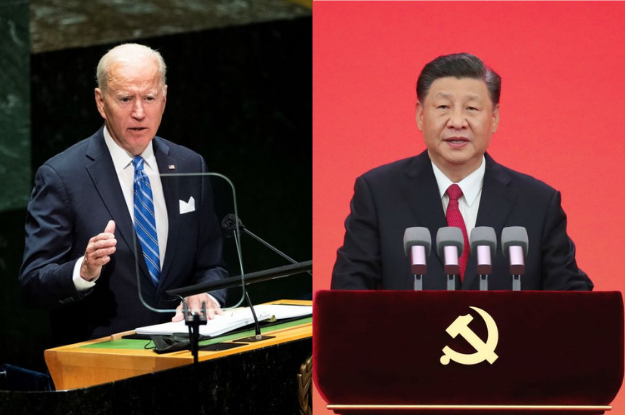At the United Nations General Assembly last week, President Joe Biden vowed his administration would work to double assistance for developing countries to address climate change, to over $11 billion annually by 2024. Not to be outdone, President Xi Jinping said, in a marked shift from previous statements, that “China will step up support for other developing countries in developing green and low carbon energy and will not build new coal-fired power projects abroad.”
The escalating rivalry between the United States and China has drawn comparisons to a new Cold War, with uncertain consequences for the rest of the world. But there could be a silver lining: If Beijing and Washington end up competing to accelerate the transition to a green economy in Latin America, as well as other low- and middle-income regions. What if adaptation to climate change becomes one of the main battlefields in the Great Power competition of the 21st century?
The idea is not as far-fetched as it may seem. Beijing and Washington seem to both recognize the economic might and diplomatic prestige that will accrue to those who can invent and distribute the world’s leading green technologies in decades to come. In fact, incentives may increase given the extremely short time horizon for the world to avoid catastrophic climate impacts across the globe. In this scenario, ideas will matter more than alliances and armies. What then are the U.S. assets, comparative advantages and shortcomings?
Biden’s ambitious domestic climate justice policy agenda, focused on green jobs and justice for communities most harmed by the climate crisis, is a remarkable strength. From an impressive jobs plan to build a cleaner U.S. economy to pledging that 40% of climate, energy, and infrastructure spending will go to marginalized neighborhoods, the Biden administration is showing that the transition to a low carbon economy can benefit Americans.
In theory, this puts Washington in a prime position to be a leader on climate change elsewhere in the world. The United States could help other countries by increasing financing for adaptation, transfer relevant technologies and capacities (such as climate analytics predictive modeling), as well as assist countries in planning for and adapting to climate change. Indeed, Biden has repeatedly vowed to make climate change a priority in his administration’s foreign policy to an unprecedented degree in U.S. history.
But Brazil is a prime example of where the Biden administration’s actions have so far fallen short of these ideals. Worried about competition in other areas, his administration seems open to overlooking President Jair Bolsonaro’s aggravation of the world’s climate crisis as Amazon deforestation surges, not to mention his repeated assaults on democracy. Last month, even as Bolsonaro was threatening to act outside of Brazil’s Constitution, National Security Advisor Jake Sullivan offered support for alliance partner status for Brazil at NATO, while trying to convince Bolsonaro not to choose China’s Huawei in the country’s upcoming 5G bid. Probably emboldened by the visit, Bolsonaro later staged a military parade before Congress coinciding with a vote on controversial changes to the voting system he supports. The whole episode raised questions about just how important climate really is to U.S. diplomacy — not just in Brazil, but elsewhere in the world.
Biden’s climate foreign policy remains tethered to the idea that progress in climate diplomacy is primarily about reducing emissions – but without bringing the social and justice parts of the transition into the mix. It would be exciting to see the Biden administration translate many of the same ideas behind its domestic climate policy into a climate foreign policy that tries to generate green jobs and create more inclusive economies where rainforests are still standing. The Biden administration could partner with frontrunner countries in the region, like Chile, Colombia, and Costa Rica, to ensure their ambitious climate policies tackle the social dimensions of the transition, increasing the likelihood of success in countries facing significant public discontent amidst a challenging pandemic economic context.
A focus on delivering justice for vulnerable populations most harmed by the climate crisis should cut across these efforts, as it now does in U.S. domestic climate policy. El Salvador, Guatemala, and Honduras are among the most climate vulnerable countries in the world. A job-generating initiative to create green and social infrastructure that allows vulnerable communities to adapt should be a core focus of the Biden administration’s policy to address the root causes of migration from the Northern Triangle.
For the Caribbean, the climate crisis is an existential threat. The Biden administration can help center the voice and power of vulnerable populations in anticipating, adjusting to, and withstanding climate impacts through increased climate financing and assistance. This could include a focus on renewable, distributed, and community-controlled microgrids, which can ensure energy sustainability after major climate disasters.
A climate justice foreign policy would make the U.S. more attractive than China for low- and middle-income countries facing accelerating climate impacts. Democracy, with all its imperfections, equips nations to grapple with and engage diverging viewpoints, and to struggle to give voice and power to marginalized populations bearing the brunt of climate impacts.
China’s Belt and Road Initiative, which aimed to increase China’s power and influence globally, has angered several governments in Africa and elsewhere, who are now saddled with debt from poorly planned and executed infrastructure projects. Indigenous and marginalized populations in countries where land was seized to make way for infrastructure have protested and expressed their strong concerns and dissatisfaction to their governments. Chinese coal projects have faced significant civil society resistance in Bangladesh, Kenya, Vietnam, and other countries. By bringing in Chinese workers to build Belt and Road projects rather than hiring local workers, these projects have generated anger and resentment. These challenges and failures reflect the ways in which China’s authoritarian system is simply ill equipped to balance the interests of diverse stakeholders in these contexts.
What would this mean for Biden’s engagement with Latin America’s two largest greenhouse gas emitters, Mexico and Brazil? Under President Andrés Manuel López Obrador, Mexico has gone from being a climate leader to ramping up coal and oil as governments around the world try to shift away from coal and other fossil fuels. As the United States’ biggest trading partner, Mexico will be tremendously impacted by the U.S. shift to a green economy. With Mexico and the United States re-initiating the High-Level Economic Dialogue, a people-centered, jobs approach to the transition in the Biden administration’s engagement with Mexico on climate is more likely to succeed and benefit both economies than more heavy-handed approaches, such as including climate only targets in trade agreements.
In Brazil, while the Biden administration’s focus on protecting the rainforest is welcome, Bolsonaro and his government are not reliable partners for these efforts. Overlooking Bolsonaro’s repeated attacks against Brazil’s democratic institutions in seeking to reach an agreement on climate undermines the United States’ main comparative advantage over China: its capacity to show the world that democracy is the best way to face the climate crisis and other key 21st century challenges.
Instead, building on recent meetings U.S. Special Presidential Envoy for Climate John Kerry and Sullivan each had with Brazilian state governors, the U.S. should engage a broader set of interlocutors to curb deforestation, including civil society, sub-national governments, and the private sector. In particular, the Biden administration should deepen engagement with state and local authorities in the Amazon, supporting their efforts to advance an agenda that protects the rainforest while providing sustainable livelihoods to its population. An example of this is the Green Recovery Plan, put forth by the Consortium of Governors of the Legal Amazon, which brings together governors from across the political spectrum to curb deforestation and build an inclusive, standing-forest economy.
President Biden’s focus on climate as a top foreign policy priority is impressive and welcome. Adding an optimistic, people-centered approach to its climate foreign policy can position the U.S. favorably in its strategic competition with China and advance a just climate transition in low- and middle-income countries across the globe.
—
Abramovay is regional director of Latin America and the Caribbean at the Open Society Foundations.
Griggs is deputy director of the Latin America Program acting co-lead of the Climate Justice Initiative at the Open Society Foundations.






